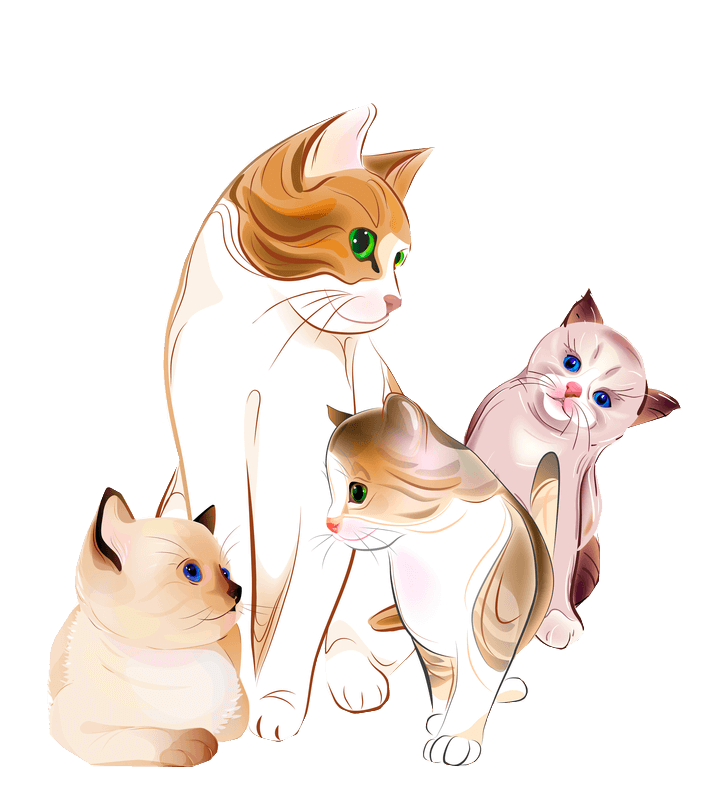Newborn Kittens
NEWBORN KITTENS
The early stages of life, as newborn kittens, are crucial to the development of a cat. Cats and dogs share similar stages of early life but the socialization aspects, amongst others, are different from dogs. Like dogs, newborn kittens are deaf and blind at birth and begin to open their eyes and ears at about 12 to 14 days of age. It is also at this important time that newborn kittens are able to control their body temperature independent of the environmental or home temperature. This is a characteristic of all mammals. This ability is called poikilothermic.
During the first few weeks of life, newborn kittens spend a tremendous amount of time sleeping; all curled up against their siblings and the mother. The rest of the time is spent nursing and hanging off of mom. Newborn kittens gain a tremendous amount of weight in a short time. At a month of age, newborn kittens usually weigh about 1 pound. The general rule of thumb, to age a cat up to 6 months of age or there about, is to remember that 1 pound equals one month of age. So a 3 pound kitten is about 3 months of age and so on. Using this, plus the dental eruption pattern of a cat, it is very easy to estimate the age of an adolescent cat. Kittens will have a complete set of front teeth (incisors) at 4 months of age, canines at 6 months of age.
The early stages of life provide a boost to the kittens ability to fight off disease. Through the mother’s first milk, known as colostrum, the newborn kittens receive protective antibodies against many of the common viral infections that effect cats. Of major importance are those antibodies that protect against the myriad of upper respiratory diseases that cats easily catch. These protective antibodies are short lived and do not last long. Vaccination of kittens at 6 weeks of age takes care of that problem.
TIME MARCHES ON
As the newborn kittens age and their eyes and ears start to open, they will want to discover more of their world away from the mother. One of the great things about cats is that they use a litter box. This may seem mundane but who enjoys taking dogs outside in the pouring rain or during a mid winter snow and ice storm? Not me! (I must say that living in FL does not present those latter obstacles!) More will be mentioned in Litter Box Training but I have seen newborn kittens use a litter box even before they opened their eyes at 2 weeks of age! The average litter box for a youngster is way too tall for most kittens so use the top of a box, cut out an opening so the kitten can easily enter and line the lid with litter. In no time, the kittens will be scratching at it and using it to urinate and defecate.
During the nursing period, it is extremely important to keep the mother parasite free. Of utmost importance is to make sure the mother does not have fleas. Fleas are blood suckers and can easily infest a tiny kitten and cause severe anemia in environments with huge flea populations. Outside of causing anemia, fleas also carry tapeworm larvae. When the animal grooms itself, it swallows the flea, releasing the tapeworm larvae to develop into an adult. This takes away needed nutrition from the kitten. The most commonly used drug to treat tapeworms is praziquantel; which usually goes under the name of Droncit®.
By the time the kittens are about 6 weeks of age, it is time to get them weaned. Even at 5 weeks of age owners can off a gruel of a good solid kitten food mixed with some feline milk replacer or warm water. This will make it easier for the young kitten to initially chew the food. By the time they are 8 weeks of age most kittens are eating solid food. I recommend a kitten formula by either Science Diet® or Royal Canin®.
Now it is time to find a home for those kittens. The average kitten litter size is between 3-5. Those new kitten owners now have to take their kitten to the veterinarian for the kittens first vet visit. But first, sit back and enjoy the video to the right on proper care of a kitten!


